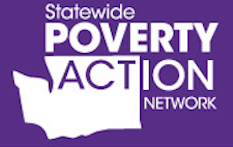 The 2019 Legislative Session is officially over.
The 2019 Legislative Session is officially over.
First, we’d like to recognize the hard work of all of you—our advocacy community. This legislative session was an important one, and because of your action, a number of critical policies (plus an entire 2 year operating budget!) are now a reality. These policies will make a huge difference in the lives and futures of Washington’s communities of color and low-income communities. Thank you to everyone who took the time to send action emails, make phone calls, post on social media, and even come to Olympia to advocate in person—these session wins could not have happened without you!
Let’s look back on session and all that we accomplished together!
On Saturday, April 27, lawmakers met the session deadline and passed a 2 year operating budget. This budget will dictate how our state spends its money over the next 2 years, and what state programs and offices will be funded. Your advocacy created the following investments (for a deeper analysis, click here):
–$14.5 million towards Housing & Essential Needs (HEN), our state’s most effective anti-homelessness program. This investment will help ensure that people experiencing homelessness will receive housing assistance, and will work to diminish the long waiting list for HEN.
–$5.02 million allocation for Temporary Assistance for Needy Families (TANF) and Working Connections Child Care (WCCC). This investment will fund the implementation of Second Substitute House Bill 1603 which also passed this session, which has eliminated permanent disqualifications and adds a time-limit extension for families experiencing homelessness.
–$175 million towards the Housing Trust Fund, which will fund the development of 5,000 new affordable homes and support anti-homelessness efforts throughout the state.
–$146,000 to support the implementation of a full dental benefit for patients receiving Medical Care Services.
Your advocacy also made some positive changes to the state tax structure. Washingtonians will now see:
–A graduated real estate tax, which will lower the real estate tax for properties valued at $250k or below and raise the tax for properties valued at $1 million and higher.
–Property tax exemptions for seniors, veterans, and people with disabilities.
–An increased Business & Occupation tax on financial institutions that have an income surpassing a billion dollars.
–The elimination of some outdated tax exemptions, such as a non-resident sales tax exemption.
Overall, we are happy to see much-needed investments in the health and human services programs that low-income children and adults in Washington state rely on during hard times. It is also notable that some modest changes to our upside-down tax code were enforced. However, it is disheartening to see that lawmakers made no significant, truly progressive changes to our state tax code, despite the best efforts of community members to advocate for a tax code that works for everyone, not just wealthy people. A progressive tax on capital gains, which lawmakers ultimately refused to pass, would have generated the necessary revenue to make truly bold investments in anti-poverty programs, and in our state overall. It would have also been a step closer to ensuring that wealthy households paid their fair share in taxes. We will keep up our advocacy work to fight for a state tax code that is truly equitable, and that relies on sustainable revenue streams.
Your advocacy also was integral in passing several important new bills. Among them are:
–The New Hope Act, which allows people with certain felony and/or misdemeanor convictions a second chance by vacating convictions from a criminal record.
–Second Substitute House Bill 1603, which strengthens the state’s TANF program (a program relied on by thousands of low-income families in Washington) by eliminating permanent disqualifications and adding a time-limit extension for families experiencing homelessness.
–A package of consumer protection bills, which lowered the rate on post-judgement interest, regulated rules around garnishment, made key changes to medical debt collections and shady debt collections practices, and offered resources to people struggling to pay their property taxes.
Once again, thank you for your advocacy this session. None of this could have been accomplished without you! Take a minute here to send your lawmaker a note thanking them for their action this session as well.
Leave a Reply